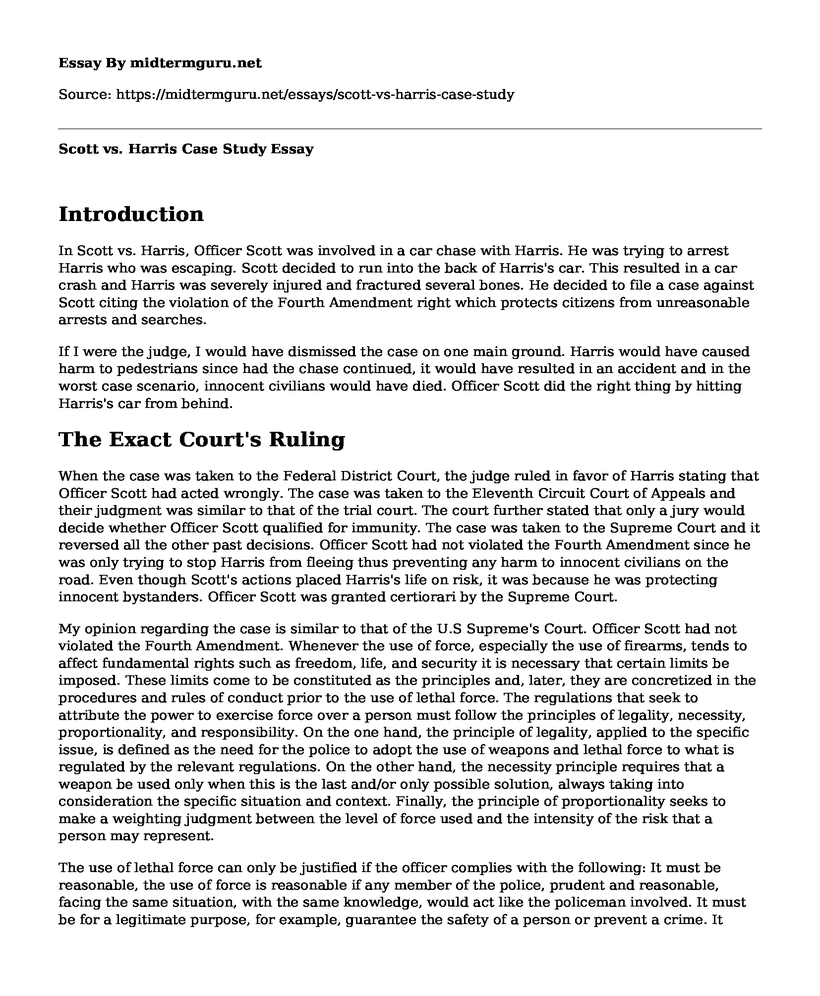Introduction
In Scott vs. Harris, Officer Scott was involved in a car chase with Harris. He was trying to arrest Harris who was escaping. Scott decided to run into the back of Harris's car. This resulted in a car crash and Harris was severely injured and fractured several bones. He decided to file a case against Scott citing the violation of the Fourth Amendment right which protects citizens from unreasonable arrests and searches.
If I were the judge, I would have dismissed the case on one main ground. Harris would have caused harm to pedestrians since had the chase continued, it would have resulted in an accident and in the worst case scenario, innocent civilians would have died. Officer Scott did the right thing by hitting Harris's car from behind.
The Exact Court's Ruling
When the case was taken to the Federal District Court, the judge ruled in favor of Harris stating that Officer Scott had acted wrongly. The case was taken to the Eleventh Circuit Court of Appeals and their judgment was similar to that of the trial court. The court further stated that only a jury would decide whether Officer Scott qualified for immunity. The case was taken to the Supreme Court and it reversed all the other past decisions. Officer Scott had not violated the Fourth Amendment since he was only trying to stop Harris from fleeing thus preventing any harm to innocent civilians on the road. Even though Scott's actions placed Harris's life on risk, it was because he was protecting innocent bystanders. Officer Scott was granted certiorari by the Supreme Court.
My opinion regarding the case is similar to that of the U.S Supreme's Court. Officer Scott had not violated the Fourth Amendment. Whenever the use of force, especially the use of firearms, tends to affect fundamental rights such as freedom, life, and security it is necessary that certain limits be imposed. These limits come to be constituted as the principles and, later, they are concretized in the procedures and rules of conduct prior to the use of lethal force. The regulations that seek to attribute the power to exercise force over a person must follow the principles of legality, necessity, proportionality, and responsibility. On the one hand, the principle of legality, applied to the specific issue, is defined as the need for the police to adopt the use of weapons and lethal force to what is regulated by the relevant regulations. On the other hand, the necessity principle requires that a weapon be used only when this is the last and/or only possible solution, always taking into consideration the specific situation and context. Finally, the principle of proportionality seeks to make a weighting judgment between the level of force used and the intensity of the risk that a person may represent.
The use of lethal force can only be justified if the officer complies with the following: It must be reasonable, the use of force is reasonable if any member of the police, prudent and reasonable, facing the same situation, with the same knowledge, would act like the policeman involved. It must be for a legitimate purpose, for example, guarantee the safety of a person or prevent a crime. It would not be a legitimate end to use force to stop an act protected by freedom of expression (as a peaceful protest) or use force because a person "seems" suspicious. It must be proportional, violence or force majeure cannot be used to avoid. The police are covered by the Law to use their weapon, but both they and citizens must be aware that this is only possible when the corresponding procedure has been carried out and is extremely necessary. Otherwise, if a criminal is unarmed, cooperates with the police or similar, the use of a weapon by the police will not be justifiable.
Cite this page
Scott vs. Harris Case Study. (2023, Jan 16). Retrieved from https://midtermguru.com/essays/scott-vs-harris-case-study
If you are the original author of this essay and no longer wish to have it published on the midtermguru.com website, please click below to request its removal:
- Essay on Problem-Solving Courts
- Paper Example on Uniform Crime Report
- Research Paper on Cybercrime
- Paper Example on History of US Jails
- Research Paper on Pregnant Women in Prison
- Surviving Prison in the US: A Decade of Change - Research Paper
- 100 Americans Killed by Guns Every Day: The Consequences of Gun Violence - Essay Sample







